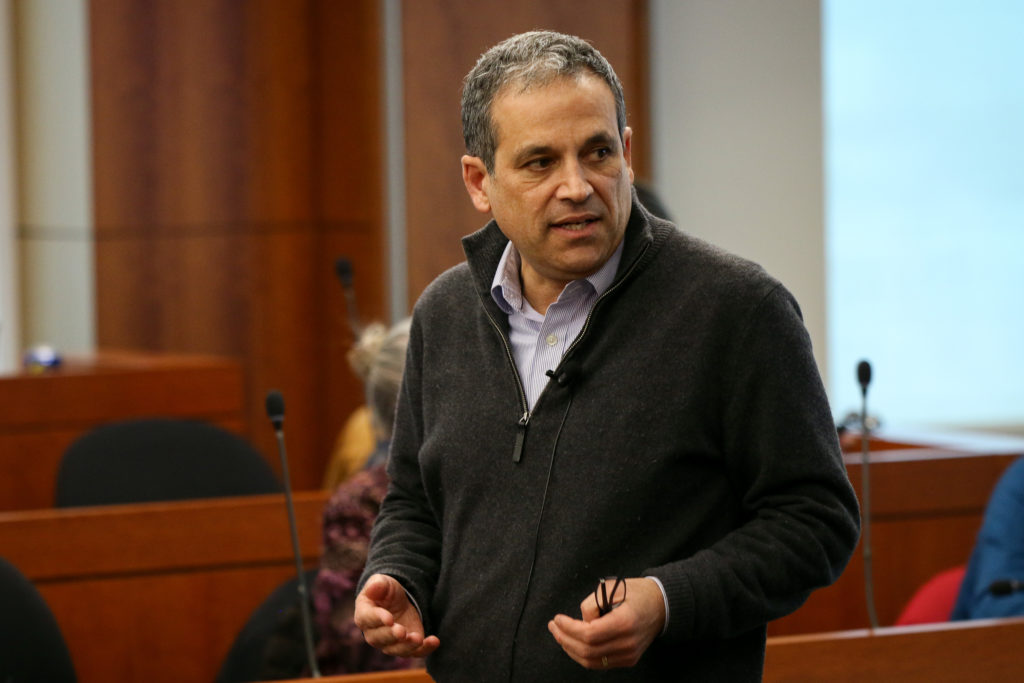After a dragged out presidential election, faculty said they adjusted due dates and worked conversations about the race into their course material.
More than 10 professors said officials’ decision to make Election Day a University holiday helped students catch up on classes, but they still wanted to prepare for a potentially long election week. Anticipating students would grow tired after staying up late to watch the results play out or working on campaigns, faculty said they extended assignment due dates weeks in advance.
Forrest Maltzman, a professor of political science, said he focused his Introduction to American Politics and Government course around the time of the election on voter enfranchisement and political advertisements. During class, he said students discussed different ways the media has covered those issues around the time of the election.
“It is a political science class on American systems, so this is front and center for what we do,” Maltzman said. “I have always tried to incorporate both some of the political science theory, some of the political science methodology and real examples that are occurring.”
Maltzman said he was “excited” to teach his class during the election season and even adjusted his sabbatical for the opportunity to do so. He said his students were anxious on Election Day, but he noticed that after the race was called, students seemed more at ease.
He added that he gave students more time to complete assignments, like a midterm exam, to provide more flexibility as some students were working on campaigns.
“GW has had students that come to the University in large parts because of their interest in politics, a large part because of GW’s commitment to helping us build a better understanding of our political system,” Maltzman said. “So there’s a lot of enthusiasm.”
Maranda Ward, an assistant professor of clinical research and leadership at the School of Medicine and Health Sciences, said she encouraged her Psychosocial Aspects of Health and Illness class to engage in “post-election healing” by inviting a yoga instructor to lead a class on Nov. 4.
“Our bodies carry the stress, emotions and experiences we face,” Ward said. “Tuning into how our bodies feel and heal is an act of resistance against the ‘grind culture’ we live in that suggests we need to operate as machines on the go, go, go.”
She said she offered a grace period to her students by letting them hand in one set of class notes for a full score, which could replace a previous work they had missed or not submitted.
“It is necessary to be and feel human,” Ward said. “Not only are we all experiencing emergency remote instruction during a triple pandemic of COVID-19, state-sanctioned violence and racism, but we are all so increasingly anxious during this historic election season.”
Jill Kasle, an associate professor of public policy and public administration, said students in her constitutional law class were “too tired” in the days after the election to focus on school work. She said her students had trouble “keeping their eyes open” in class, so they instead discussed the immediate aftermath of the election and the uncertainty surrounding the results, tying it to the Supreme Court and its involvement in past presidential elections.
Students said they felt anxious and lacked motivation in their classes in the weeks leading up to the election and hoped that faculty would be flexible in their assignments around that time.
Kasle said the day after the 2016 election was not a “happy day” because many students were disappointed with the results, and she had “no way” to lecture as she normally would have. She said she did not know what to expect this year but was “fortunate” to not have to deal with the challenge of consoling students virtually.
Roughly 400 students walked out of class after the 2016 election and joined a march to the White House in protest of then-President-elect Donald Trump.
At least 15 faculty members also altered plans for their classes after the 2016 election by discussing the results, postponing exams or canceling class entirely.
“I didn’t have Zoom rooms full of crying students,” Kasle said. “I had anxious students but not crying students, so I felt it was important to process the anxiety and do what I could to be reassuring, although there wasn’t a great deal I could do right then as that was too close to the Election Day.”
Sean Aday, an associate professor of media and public affairs and international affairs, said he devoted the entirety of his Media in Free Society class after Election Day to discussing the results, taking a “timeout” from the normal schedule. He added that he spent a “significant portion” of time in his senior seminar class tying topics that political communication majors were “well-versed” in like polling and campaign strategy.
“This election had the highest turnout in more than 100 years that the students were particularly interested in as it inspired a lot of passion, and so a lot of that came through in the discussion,” Aday said.
He said he relaxed the due dates for assignments in his senior seminar for students who were working on campaigns because they would likely be busy during the week of the election.
“Someone who might be working at the Republican National Committee is swamped during election week,” Aday said. “There was no way it would have been fair to make them turn something in on the Wednesday after Election Day.”








